Search results for "herbert lomas"
This journey
30 September 1995 | Archives online, Fiction, poetry
Poems from Tämä matka (‘This journey’, 1956). Introduction by Jukka Petäjä
You took a planet
For Erik Lindegren
The stars arranged themselves
round a red magnet
by request,
and shaped fugitive systems and mirror reflections,
space’s sonorous grammar.
Oh, those hatched-out faces of the apathetic! –
and the grudge of those who can no longer read
(apart from cruel bibles, containing pressed roses and corpses).
Oh, ourselves! – here in the lonely sublunar place, hair and eyes in the wind, in our hands ignorance and boomerang-echoes.
Oh, these vaultings of the word! – changing skies
where the glyphs rise like distress flags.
I looked for a question whose answer is this mutabor. I kneel to gather up the shattered fragments of a glyph scored with the brilliant wounded secret where I lost my wings before my choosing fingers were formed.
More…
The way to anywhere
30 September 2003 | Archives online, Fiction, poetry
Poems from Parittelun jälkeinen selkeys (‘Post-coital clarity’, WSOY, 2003). Introduction by Matti Saurama
Enlightenment needs no tools
1. And I laughed at everything
and didn’t want to see anything old
there was a fingernail-sized buddha and I walked by it
in the room, trying to find the ceiling,
camping out in life, fag in mouth
the soft letters of the clouds, and a blowing skysign
oh sky
2. I stand on the street corner
illuminated like a phone box.
On the way to anywhere
and always there already. More...
Boys Own, Girls Own? –
Gender, sex and identity
30 December 2008 | Essays, Non-fiction
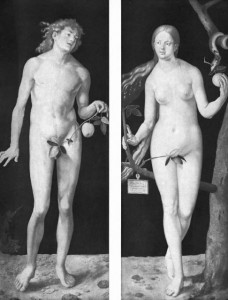
Knowing good and evil: Adam and Eve (Albrecht Dürer, 1507)
In Finnish fiction of the present decade, both in poetry and in prose, there seems to be at least one principle that cuts across all genres: an overt expression of gender, writes the critic Mervi Kantokorpi in her essay
Relationships and family have always been central concerns of literature; questions about gender and individual identity have received a new emphasis in Finnish literature from one season to the next. The gender roles represented in contemporary literature appear to become ever more stereotypical. The question is no longer only of the author consciously setting his or her gender up as the starting point for expression, as has already long been the case with modern literature written by women. More…
Living inside language
23 February 2010 | Essays, Non-fiction
Jyrki Kiiskinen sets out on a journey through seven collections of poetry that appeared in 2009. Exploring history, verbal imagery and the limits of language, these poems speak – ironically or in earnest – about landscapes, love and metamorphoses
The landscape of words is in constant motion, like a runner speeding through a sweep of countryside or an eye scaling the hills of Andalucia.
The proportions of the panorama start to shift so that sharp-edged leaves suddenly form small lakeside scenes; a harbour dissolves into a sheet of white paper or another era entirely. Holes and different layers of events begin to appear in the poems. Within each image, another image is already taking shape; sensory experiences develop into concepts, and the text progresses in a series of metamorphoses. More…
Poems
30 June 1982 | Archives online, Fiction, poetry
Sirkka Turkka is among the most important poets who started their work in the 1970s. So far she has published five collections of poetry and one work in prose. ‘I speak of death when I mean to speak of life,’ writes Sirkka Turkka in one of the poems in her collection Mies joka rakasti vaimoaan liikaa (‘The man who loved his wife too much’, 1979). The theme of death is close at hand, too, in the previously unpublished poems printed below. Introduction by Arto Kytöhonka
1
Before death itself comes
it paints the pine boles red
around this house
It erects a moon in the sky, a luminous moon,
set on edge like an old dish
with the light enamel peeling off.
Onto this house, over which
night is now pleating.
And the house, in the veering waters, in the clinging waters,
is slowly preparing itself, quite by itself, for death. More…
World noises
30 September 1992 | Archives online, Fiction, Prose
Poems from Fahrenheit 121 (1968) and Jos suru savuaisi (‘If grief should smoulder’, 1968). Introduction by Tuula Hökkä
For truth to tell
I like horses most
creating Those
It came off best
*
Morning came to the meadow;
horses were born out of mist.
How quiet they were:
one leant a head on his master’s armour,
his breath rose warm,
his moist eye gleamed in the daybreak,
his coat a casbah carpet-weaver’s hand-woven pile,
his muzzle softer than a phallus. More…
We’re all perfect
31 December 1990 | Archives online, Fiction, poetry
Poems from Laki (‘The law’, 1990)
The Law
No one’s stupid – there are
people deprived of the wise,
and those with self-respect
knocked flat. No one’s
hardened – there are people with
calloused wounds.
No one’s blind – there are
people cataracted by custom. Be different:
heal wounds and look up – wake
your dear one in mid-sleep, hug her.
(We’re all perfect.) More…
New from the archive
26 March 2015 | This 'n' that
This week, a cluster of pieces from and about left-leaning Tampere, the ‘Red City’ of Finland
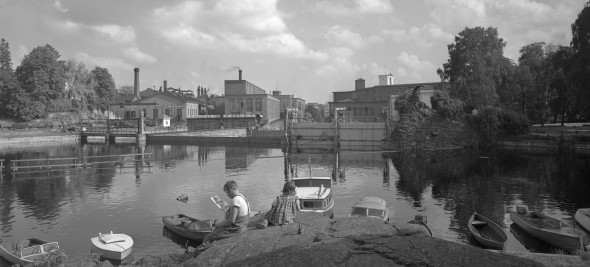
The Tampella and Finlayson factories, 1954, Tampere. Photo: Veikko Kanninen, Vapriikki Photo Archives / CC BY-SA 2.0.
Also known as the ‘Manchester of Finland’ for its 19th-century manufacturing tradition, Tampere – or rather the suburb of Pispala – produced two important, and strongly contrasting, writers, Lauri Viita (1916-1965) and Hannu Salama (born 1936). Both formed part of a group of working-class writers who emerged after the Second World War, many of whom had not completed their school careers and whose confidence arose from independent, auto-didactic, reading and study.
To understand the place from which these writers emerged, it has to be remembered that there is more to Tampere than a proud radical tradition. As Pekka Tarkka remembers in his essay, the Reds were the losing side in the Finnish civil war of 1918, and for years afterwards they formed ‘a sort of embattled camp in Finnish society’. History is always written by the winners, and authors like Viita and Salama played an important role in giving the Red side back its voice.
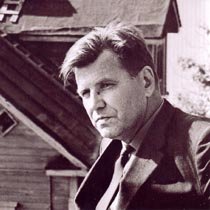
Lauri Viita.
Lauri Viita celebrated Tampere by offering an image of it that is, as Tarkka remarks, ‘poetic, deterministic and materialist’. His poetry differed sharply from the modernist verse of contemporaries such as Paavo Haavikko and Eeva-Liisa Manner, both of whom we have featured recently in our Archive pieces, which abandoned both fixed metres and end-rhymes. His work was an often heroic celebration of the ordinary life of proletarian Tampere, and the more traditional form into which it breathed new life made it accessible. My own mother, for example, who had grown up the child of a Red working-class family far away to the north, in Kajaani, steeped in the rolling cadences of poets such as Aaro Hellaakoski and Uuno Kailas, never really got the hang of Haavikko, or Manner; but she loved Viita.
Here we publish a selection of Viita’s poems, translated by Herbert Lomas, who does an excellent job of capturing his easy-going, unselfconscious rhythms. The introduction is by Kai Laitinen.
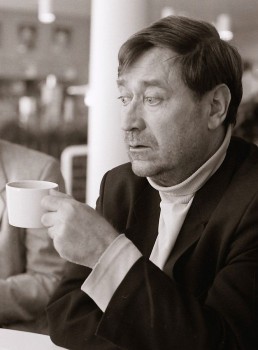
Hannu Salama.
Photo: Ptoukkar / CC BY-SA 3.0
Salama is a far more politicised writer than Viita, and he is writing about a Tampere that is already in decline. In his major work, Siinä näkijä missä tekijä (‘No crime without a witness’, 1972), he writes about the travails of the communist minority, doomed to slow extinction – the same band of fellow-travellers to which my grandfather in Kajaani belonged. My mother wasn’t a Salama fan, though – I think his Tampere wasn’t beautiful, or heroic, enough. As someone who had moved far away, to England, she wanted to celebrate, not to mourn.
Here we publish a short story, Hautajaiset (‘The funeral’), which was written at the same time as Siinä näkijä missä tekijä. It’s an unvarnished account of a Tampere funeral which is, at the same time, the funeral of the old, radical way of life – which, sure enough, has vanished almost as if it never existed. As Pekka Tarkka writes of Salama’s short story and the revolutionary songs which run through it: ‘There will be no more singing of communist psalms, or fantasies of the family and of the revolutionary spirit.’
As Marx didn’t say, all that seemed so solid has melted, irretrievably, into air.
*
The digitisation of Books from Finland continues, with a total of 380 articles and book extracts made available online so far. Each week, we bring a newly digitised text to your attention.
Like father, like daughter
31 March 1999 | Archives online, Fiction, Prose
Extracts from Tom Tom Tom (Gummerus, 1998). Introduction by Soila Lehtonen
A father and daughter in a hospital back garden
Bits of nail flick to the ground as Kokko cuts Tom’s nails, leaving rather brittle nail-ends among the lichen. In the middle of the hospital afternoon they’ve made their way down to the little park, to care for the hands of both of them, all four.
In the days before Africa Tom used to nurse Kokko on the living-room sofa and cut the nails on her most difficult hand, pushed the cuticles back and taught her the care that ought to be taken of nails, or she’d have smarting and pain round the cuticles. Kokko used to plead to be taken into his nail cutting lap oftener than she should, even when she’d really have preferred to grow longer nails. More…
Burnt orange
30 September 1992 | Archives online, Drama, Fiction
Extracts from the play Poltettu oranssi (‘Burnt orange‘): ‘a ballad in three acts concerning the snares of the world and the blood’. Introduction by Tuula Hökkä
The scene is a small town in the decade before the First World War
Cast:
DR FROMM
an imperial,bearded middle-aged gentleman
ERNEST KLEIN
a moustached, ageing, slightly shabby leather-manufacturer
AMANDA KLEIN
his wife, well-preserved, forceful, angular
MARINA KLEIN
their daughter, shapely, withdrawn, wary
NURSE-RECEPTIONIST
open, direct, not too ‘common’
ACT ONE
Scene two
After a short interval the receptionist opens the door and ushers Marina Klein into the surgery. Exit the receptionist. Marina immediately goes to the end of the room and presses herself against the white wall. The white surface makes her look very isolated in her ascetic black dress. The Doctor, who now appears to be headless – an impression produced by the lighting and the yellowish background – half-turns towards her. More…
Renaissance man
30 September 1990 | Archives online, Fiction, Prose
An extract from the novel Bruno (WSOY, 1990)
Since her first collection of poems, which appeared in 1975, Tiina Kaila (born 1951 [from 2004, Tiina Krohn]) has published four children’s books and three volumes of poetry. Her novel Bruno is a fictive narrative about the Italian philosopher Giordano Bruno, who was burned at the stake in 1600. It is the conflict inherent in her main character that interests Kaila: his philosophical and scientific thought is much closer to that of the present day than, for example, that of Copernicus, and it is this that led him to the stake; and yet he did never abandon his fascination for magic.
The novel follows Bruno on his journeys in Italy; France, Germany and England, where he is accompanied by the French ambassador, Michel de Castelnau. Bruno finds England a barbaric place: ‘…These people believe that it is enough that they know how to speak English, even though no one outside this little island understands a word. No civilised language is spoken here’
In the extract that follows, Bruno, approaching the chalk cliffs of Dover by sea, makes what he feels to be a great discovery: ‘Creation is as infinite as God. And life is the supremest, the vastest and the most inconceivable of all.’
![]()
I was leaning on the foredeck handrail, peering into a greenish mist. The bow was thrashing between great swells, blustering and hissing and shuddering like some huge wheezing animal: Augh – aagh – ho-haugh! Augh – aagh – ho-haugh!
Plenty of space had been reserved for our use on this new two-master cargo boat. Castelnau was transferring his whole family from France – his wife, his daughter, his servants, his library, his furniture, his past and me – to London, where, as you know, he had been appointed Ambassador of France. More…
In my memory
31 December 1987 | Archives online, Fiction, poetry
Poems and aphorisms from four collections. Introduction by Erkka Lehtola
Let the healing epidemics out! There must be some.
The many-headed monster, the market ideology, it can simultaneously read, count and even write at least 666 works. And without the sign of the beast no one can buy or sell.
Those who can read know you only realise you’ve forgotten how
when you can do it again.
What a handsome winter we have here! If it weren’t so dark, we’d see it. We could orientate ourselves on the stars with the beam from a pocket torch. Somewhere in mid-sky, I’d say, they come flying along on long lights.
As a child I said I’ll do what I want. Now I want what I do.
Who’s in the middle when the two sides of your face are side by side, as they are, in the mirror.
The trees that hide the sun are bright inside.
A frosty night when you feel the stars on your skin and discuss what you’re wearing.
Somebody’s walking over there, with an umbrella over his head, taking the rain for a walk.
I’m so delighted to find so much that’s useless.
What a relief there’s no longer enough time to get acquainted.
From Tuoreessa muistissa kevät (‘Springtime fresh in the memory’), 1987 More…
New from the archive
29 June 2015 | This 'n' that
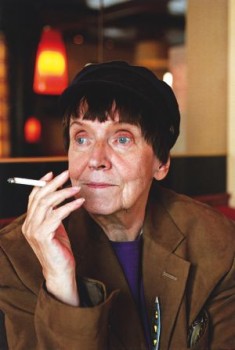
Mirkka Rekola. Photo: Elina Laukkarinen/WSOY
Enigmatic stories, poems and aphorisms by Mirkka Rekola
This week, poems and aphoristic short stories by Mirkka Rekola (1931-2015).
Rekola, as the long-time Books from Finland translator Herbert Lomas put it, was ‘a minimalist before minimalism was invented’. Amazingly enough, her sparklingly terse writing was considered ‘difficult’, and she had to wait until the 1990s before her work was widely read.
Rekola produced her first collection, Vedessä palaa (‘Burning water’) in 1954, making the cardinal mistake of choosing as publisher the conservative WSOY rather than the avant-garde Otava. The book received mixed reviews; as she said, ‘for readers of traditional verse I was completely unfamiliar, while for ultra-modernists I was not modern enough.’
All the work we revisit here shows the extraordinary vividness, accuracy and exuberance of her writing – both in the poems and the often ruefully funny short stories called ‘Mickeys’.
![]()
The Books from Finland digitisation project continues, with a total of 402 articles and book excerpts made available on our website so far. Each week, we bring a newly digitised text to your attention.
